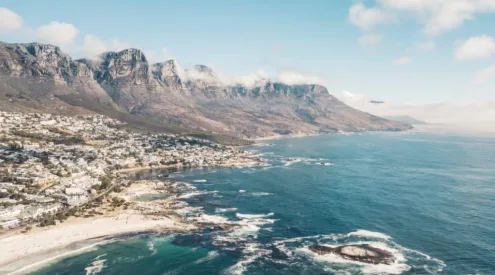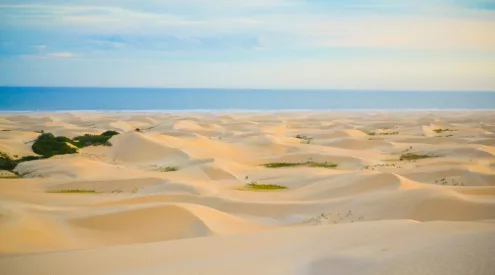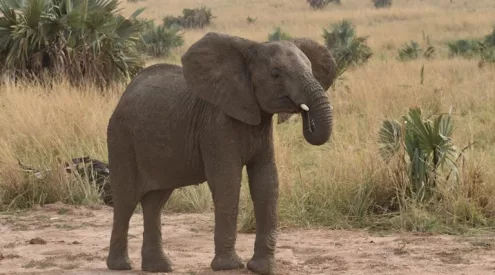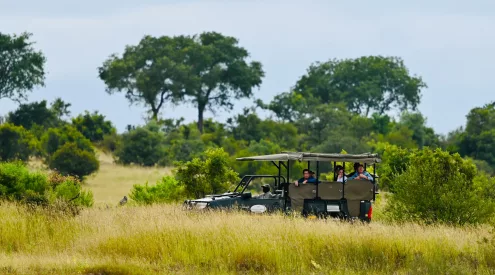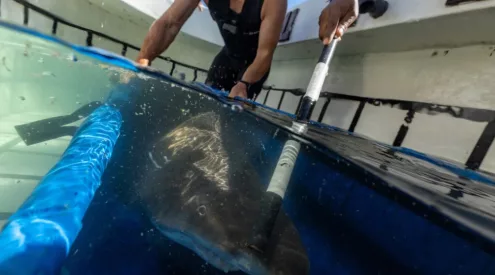‘Pangolin Protector Dr Mark Ofua has dedicated his life to rescuing, rehabilitating and releasing injured and orphaned pangolins, the most trafficked mammals in the world, speaking out against the illegal wildlife and bushmeat trade and campaigning for better protection of Nigeria’s wildlife,’ writes Lisa Abdellah.
ALSO SEE: New path for aspiring field guides in South Africa
‘My first encounter with a pangolin was at a bushmeat market,’ Dr Mark Ofua begins. He’s a wildlife veterinarian who runs Saint Mark’s Animal Hospital and a pangolin orphanage in Lagos, Nigeria. ‘It was coiled on a bushmeat seller’s table, and as I continued to observe, it straightened a little. We locked eyes.’
Dr Ofua describes a tribe in Nigeria that nicknamed pangolins ‘idiots’ because they cover their head and front legs when startled and roll up completely into a protective ball if touched or grabbed, exposing their scales to predators – including poachers. When he met a pangolin for the first time, that was the last thing that came to mind. ‘I saw a wise animal with whom I felt spiritually bonded. I felt his appeal for help in my heart. There was no way I was going to leave him there.’
The bushmeat seller refused to part with the animal, telling him he’d already sold it. They argued – as Dr Ofua would do numerous times more in trying to find a middle ground with those who make a living harvesting pangolins.
He took the mammal home, where he treated a wound it’d sustained in captivity. He began to read about pangolins, discovering fascinating facts. ‘They’re nocturnal, the only mammals that are covered with scales and have a gizzard, and their tongues, which they use to eat ants and termites, are almost as long as their bodies, extending to their lower chest,’ he enthuses. ‘They’re also incredible escape artists – I call them the Houdinis of the animal world. If you put them in a room, it’d better be foolproof because they’ll find a way out, climbing up a corner where two walls meet or using their powerful claws to dig a crack into a hole they can fit through.’
Why was someone selling pangolins at a bushmeat market? According to WWF, ‘they’re the most trafficked mammals in the world. All eight species, four in Africa and four in Asia, are protected under national and international laws, and all are the threatened with extinction as assessed by the IUCN, with three classified as Critically Endangered. Over past decade, over a million pangolins have been taken from the wild to feed the consumer demand for meat, scales and other body parts’.
According to the Wildlife Justice Commission, Nigeria has become a global export hub, linked to 55% of scales seized between 2016 and 2019. In West Africa, everything that moves and breathes is fair game as food. So, the first threat to pangolins is the bushmeat trade. But most Nigerians don’t eat bushmeat because they can’t afford it. It makes more sense to buy five chickens to feed your family than one grasscutter (a greater cane rat) because they cost the same but yield more meat.
An elite taste drives the bushmeat trade. Asians consider pangolins’ meat a delicacy, and they believe their scales have medicinal powers to do everything from warding off witchcraft to curing hypertension. ‘Pangolin scales are made of keratin, as are our fingernails and hair,’ says Dr Ofua. ‘It’s like saying you can cure ailments by eating your fingernails.’ As pangolin populations in Asia have declined, shipments from Africa have increased to meet the demand. ‘When traditional people caught a pangolin, they’d save the flesh but remove the scales and throw them away. Today, they hunt them specifically for their scales. And of the 1.3 million migrants living in Nigeria, some of the Asian population harvest pangolins themselves. If you already work outside town centres as a farm worker or logger, it is easier to get away with an illegal activity. Poachers put pangolin scales into the bottom halves of containers, cover them with charcoal, and load them onto trucks that go straight to the wharf for shipping overseas.’
Since some species of pangolin, such as white- and black-bellied, live and feed high up in trees, logging and agricultural expansion also cause habitat loss.
LOVE, ACTUALLY
That pangolin wasn’t the first animal Dr Ofua rescued and rehabilitated, nor would it be the last. When he was growing up, he had a collection of Gerald Durrell’s books, a British naturalist and writer who documented his travels through Africa and the animals he encountered there. What he read contradicted what he’d been told in this part of Africa. ‘Nigerians link numerous animals to the underworld. When an owl or cat appears in your compound or lands on a rooftop or in a nearby tree, it signals someone will die that night, and touching or tasting the wall gecko’s saliva is said to cause instant death. These are among the wildlife vulnerable to killing or being sold at fetish markets to voodoo priests. ‘We lived next door to the head teacher of my school. He’d hunt at the weekend and bring all sorts of dead animals home from the forest. That was my first interaction with wildlife, which was fascinating yet profoundly sad. I wondered why would anyone want to eat this beautiful monkey?’
Dr Ofua remembers being 13 years old, escaping to the garden at his family home to prepare for an exam in peace. It’s night-time, around 8.30 pm, and he feels something touching his leg. It’s a cobra. It rears its head, almost to eye level, and he freezes with fear. The snake could kill him but slithers away. The next time he sees a snake, he’s with his school friends, who run to grab a stick, intending to kill the reptile. He covers the snake with his leg. His friends strike him instead, but the snake gets away.
‘My family wasn’t surprised when I told them I wanted to be a veterinarian. As a child, I carried eggs home, not knowing what they were, and incubated and hatched them. I caught scorpions. and put them in matchboxes and brought home stray cats and dogs.’ His parents eventually gave up sending him to the naughty corner due to his persistence. They hoped he wouldn’t bring home an animal that might bite them or transmit disease. His friends thought he must be a witch because he had a connection with snakes.
Dr Ofua trained as a vet. He started at Saint Mark’s and took over when the previous owner retired in 2014. He visited bushmeat markets, where he would offer to buy the animals that were still alive, take them to the clinic, rehabilitate and release them. ‘When bushmeat traders saw me coming, they’d taunt, “Here comes the crazy man. Doctor, my child isn’t well. Come and treat them and leave the animals alone,” They sometimes physically attacked me if they blamed me for the government temporarily shutting them down.”
At the animal clinic, it’s a race against time because pangolins don’t do well in captivity. “They’re dehydrated and may have cuts and bruises, gunshot or machete wounds or skin rot – why would you shoot a pangolin? We treat them and allow them to recover so they’re ready for release.’ Saint Mark’s releases the pangolins at Lufasi Nature Park, a private park with trees and anthills where they will thrive.
Dr Ofua also witnessed pangolin pups born on the tables at bushmeat markets, their mothers often weak or dying. He once had to perform an emergency caesarean because the mother was too weak to push. He remembers crying shamelessly while the locals laughed at him for showing emotion toward an animal. The bushmeat sellers had no use for the babies, so he started an orphanage.
‘The pups need around-the-clock care for the first six months, so we can only look after five at a time. I put them inside my gown on my chest so they can hear my heartbeat, as they would their mothers’, which helps them to feel warm and secure. A pangolin pup can take about an hour to finish one meal, so it’s serious work. Then, we introduce them to nature. Until then, they’ve been eating freeze-dried ants. It’s funny watching them meet live ants that fight back. They run away. They’re like, no, no, no, I don’t want this!’
Saint Mark’s monitors the pups’ weight and ability to forage by themselves, and eventually, usually between nine and 13 months, they’re ready to be released at Lufasi.
WORDS ARE THE TRUE WEAPON
Asked if his efforts have helped change people’s perceptions of pangolins and even inform policy locally, Dr Ofua says he might have answered differently four years ago. He begins with a story of a little girl standing on a seashore after a storm. Starfish have washed up on the beach and will die when the sun rises. One by one, the girl picks them up, runs towards the ocean and throws them back in the water. An old man is watching her, and he says, ‘The sun’s coming out, and even if you save a few hundred starfish, the millions still stranded will die, so what difference will you make?’ She answers, ‘I might not make a difference to all the starfish, but for the ones I save, I’ll make all the difference to them.’
Dr Ofua has never believed he could save every pangolin in Nigeria, but his efforts have been the difference between life and death for those rescued.
At first, he was angry with the bushmeat sellers and hunters for decimating our wildlife to satisfy their selfish needs, but after he interacted with them, he says he ‘realised they’re ordinary people who want to make a living. Most of them said they learnt the trade from their parents, and some had gravitated towards it because they couldn’t find another job despite graduating from university’.
So, he changed his tack, offering an olive branch in the form of ‘crusades’, educating them about their role in pangolins’ survival, the ecosystems they call home and what it would mean for the planet and humanity if we were to lose them. ‘I realised two things: that the bushmeat sellers didn’t understand the concept of extinction – they thought hunters who returned from tracking pangolins empty- handed were lazy and hadn’t gone deep enough into the forest to find them. And that they thought catching diseases from animals was a myth the government had introduced to stop them from plying their trade.’
He also started a conservation club that teaches hunters and bushmeat sellers’ children how to protect the environment and even arranged a private tutor for those who didn’t know how to read. ‘Their parents accepted me because they could see their children loved me and were benefitting academically.’
When Dr Ofua offered to treat their pets and livestock for free, they were more willing to part with the pangolins. Three years ago, Peter Knights, OBE, the co- founder and CEO of Wild Africa, visited Nigeria and persuaded Dr Ofua to help them turn around people’s perceptions and affect positive changes for pangolins.
Amo Farm Sieberer Hatchery Ltd (AFSH) had developed a breed of chicken called the Noiler, a cross between the Nigerian indigenous chicken, known for being disease-resistant and having a gamey taste, and the White Plymouth Rock chicken, which is meaty. Wild Africa worked with them to help them get their chickens to bushmeat sellers and hunters. ‘We promised them that if they stopped trading pangolins, we’d give them these chickens to raise. They were willing to try that and were happy the poultry sold better than the pangolins because they are meatier and tastier.’
On 16 October 2023, Nigeria publicly incinerated a significant amount of seized wildlife products, including pangolin scales, in Abuja, Nigeria’s capital, which various government agencies, local and international environmental NGOs and wildlife conservation experts attended. The National Environmental Standards and Regulations Enforcement Agency (NESREA), collaborating with the Elephant Protection Initiative Foundation, with support from the United Nations Office on Drugs and Crime, reduced 3 914 kg of seized pangolin scales to ashes. Dr Ofua puts it into context: ‘That’s the equivalent of 4 000 dead pangolins.’
Nigerian authorities have taken significant steps to address the trafficking of pangolins through its borders, including adopting its first National Strategy to Combat Wildlife and Forest Crime. The number of seizures of pangolin scales and prosecution of offenders in Nigeria has increased.
On World Pangolin Day this February, Wild Africa spearheaded a campaign supported by Nigerian media organisations and celebrities who committed their voices and influence to amplify the escalating threats posed by the illegal wildlife trade, particularly on pangolins.
A survey of 1 000 Nigerians conducted by Lagos-based Market Surveys International found that 88% were aware of Wild Africa’s campaign, and 86% said they’d no longer kill or consume pangolins because of what they’d learnt from it. Then there’s Dr Mark’s Animal Show, which targets kids and teenagers and has been broadcast by several TV channels in Nigeria and across Africa, including Showmax, and the short film Dr Mark: Pangolin Hero (online as part of Wild Africa’s Unsung Heroes series).
When we interviewed Dr Ofua, the Endangered Species Conservation and Protection Bill had passed its second reading in Nigeria’s House of Representatives. If it becomes law, it’ll further disrupt and deter illegal wildlife trade within the country, for example, by imposing stringent penalties for traffickers and poachers.
The number of pangolins Saint Mark’s has had to rescue has steadily dropped over the last few years from 200 per year to 65 this year. In such a short time, Dr Ofua has persuaded people to care about pangolins and pave the way for a better future for this unique mammal.
‘I thought this mindset change would only happen in my children’s lifetime, but in my lifetime? I’ve realised our work is important to reverse the trend and not have these animals go extinct.’
HOW TO HELP
Find out what a pangolin is and how their survival affects ours. Then, look for an NGO close to you that saves these mammals, donate to their efforts and share their messages on social media. It’s about raising awareness. ‘The worst form of loss is when you lose something you didn’t even know you had,’ says Dr Ofua. ‘Let’s say you have a wad of cash in your pocket. It’s easy for someone to steal it if you don’t know it’s there to protect.’
Further resources to check out: Saint Marks Animal Hospital and Wild Africa.
This article was originally published in the September 2024 issue of Getaway. Find us on shelves for more!
Follow us on social media for more travel news, inspiration, and guides. You can also tag us to be featured.
TikTok | Instagram | Facebook | Twitter

